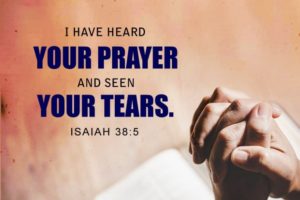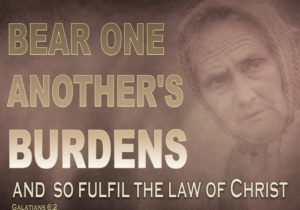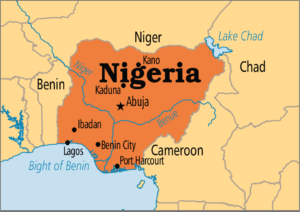TODAY’S READING FROM THE OLD TESTAMENT- ISAIAH 37:1- 38:22
How the enemy loves to bully and intimidate! Satan is a liar, slanderer and accuser and his children become fluent in his native language (John 8:44, Revelation 2:10). (The Greek word used for ‘devil’ is ‘diabolos’ which literally means, ‘slanderer’.) His method of belittling that which is honorable and degrading that which is holy is evident in the behavior of fallen man.
Sennacherib and his Assyrian commander, the Rabshakeh (meaning ‘chief of the princes’), taunt, goad, threaten and ridicule King Hezekiah. They seek to undermine all godly counsel by frightening and deceiving whatever ears they can capture.
Hezekiah’s servants, Eliakim, Shebna and Joah, were wise to obey King Hezekiah’s command not to answer the enemy. If you wrestle with a skunk you end up smelling like one. Do not give in to the enemy’s lies. They take the report to Hezekiah.
In Chapter 37 King Hezekiah responds to the report given to him by his administrative staff by tearing his robes and covering himself with sackcloth. His servants do the same. Hezekiah goes to the house of the Lord and prays. There is nothing that he can do to save the city other than to call upon God for deliverance. Eliakim, Shebna and Joah go to the prophet Isaiah in the hope that he will receive a word from the Lord.
Isaiah 37:4 4 It may be that the LORD your God will hear the words of the Rabshakeh, whom his master the king of Assyria has sent to mock the living God, and will rebuke the words that the LORD your God has heard; therefore lift up your prayer for the remnant that is left.’”
Isaiah tells the men not to fear because God has pledged to confound the plan of the Assyrians to capture Jerusalem and turn them back. He will also cause the Assyrian king, Sennacherib, to fall by the sword in his own land (v.7).
Hezekiah and his men have only the word of the Lord to trust. Their circumstances do not change instantly. The Rabshakeh returns to the King of Assyria with no clue that the Holy One of Israel has pledged to protect Jerusalem.
We walk by faith and not by sight. Sometimes situations do not seem to improve immediately, even when we have a sure word from God.
Sennacherib’s troops are ravaging Judah. God allows this as part of the promised chastisement for Judah’s infidelities. The Assyrians and their king were now at Lachish, 30 miles southwest of Jerusalem. Here they learn that the Egyptian and Cushite troops were coming to aid Hezekiah. This motivates Sennacherib to step things up with plans to take Jerusalem. Once again, he sends messengers back to Hezekiah with a letter to warn him of his foolishness to trust his God for protection.
Hezekiah takes the insolent, intimidating letter from Sennacherib, lays it out before the Lord, and prays. It is a good illustration of how we should bring everything to the Lord in prayer. This is especially true in times of crisis.
Hezekiah’s humble prayer is similar to the prayer of the disciples of the early church in Acts 4:24-31 and is packed with good Biblical theology.
The Lord responds to Hezekiah’s prayer by giving His word through the prophet Isaiah (Isaiah 37:22-35) proclaiming that Sennacherib will be defeated.
Isaiah 37:26-27 26 “‘Have you not heard that I determined it long ago? I planned from days of old what now I bring to pass, that you should make fortified cities crash into heaps of ruins, 27 while their inhabitants, shorn of strength, are dismayed and confounded, and have become like plants of the field and like tender grass, like grass on the housetops, blighted before it is grown.
God delivers Jerusalem, not because its inhabitants deserved it, but because of His covenant with David (2 Samuel 7).
Isaiah 37:35 35 For I will defend this city to save it, for my own sake and for the sake of my servant David.”
The fulfillment of the prophecy is recorded in verses 36-38:
Isaiah 37:36-38 36 And the angel of the LORD went out and struck down 185,000 in the camp of the Assyrians. And when people arose early in the morning, behold, these were all dead bodies. 37 Then Sennacherib king of Assyria departed and returned home and lived at Nineveh. 38 And as he was worshiping in the house of Nisroch his god, Adrammelech and Sharezer, his sons, struck him down with the sword. And after they escaped into the land of Ararat, Esarhaddon his son reigned in his place.
Bible scholars believe that Psalm 126 was written about these events recorded in Isaiah 37-38. It was a sudden, miraculous deliverance.
Psalm 126:1 1 When the LORD restored the fortunes of Zion, we were like those who dream.
In Chapter 38 we read of Hezekiah’s sickness that was leading to an expected death. Isaiah tells Hezekiah what the Lord has said. “Get your house in order. You will not recover. You will die.”
Hezekiah turns his face to the wall and prays for favor. Isaiah returns to Hezekiah to let him know that God heard his prayer and would grant him 15 more years to live. He would see the hand of the Lord’s deliverance of Judah from the domination of the Assyrians. (The Babylonians would invade after Hezekiah is gone).
There are some sad events in Hezekiah’s 15 extra years. Manasseh, his son, is born, and becomes the most wicked king in the Davidic line.
The prophet Isaiah served as Hezekiah’s medical advisor by telling the king’s attendants what medicine to apply. This illustrates that God can heal by any means He desires.
Hezekiah was weak in his physical condition and weak in his faith. He needed assurance. God built up his faith by confirming his promise with a sign. He had the shadow cast on the sundial go back ten steps.
Isaiah includes in his compendium a psalm that Hezekiah writes after he is healed. It contains his healing prayer:
Isaiah 38:16 16 O Lord, by these things men live, and in all these is the life of my spirit. Oh restore me to health and make me live!
In his prayer, Hezekiah expresses his gratitude for God’s gift of forgiveness:
Isaiah 38:17 17 “Lo, for my own welfare I had great bitterness; It is You who has kept my soul from the pit of nothingness, For You have cast all my sins behind Your back.
Hezekiah is eager to receive the spectacular sign that the Lord promised would encourage him. (We would love to see it to, for how do you explain it? God is God.)
TODAY’S READING FROM THE NEW TESTAMENT – GALATIANS 6:1-18
Matthew 5:23-24, 8:15-17, and Galatians 6:1 gives us instruction for godly conflict resolution and restoration of fellowship among believers.
Galatians 6:1 1 Brethren, even if anyone is caught in any trespass, you who are spiritual, restore such a one in a spirit of gentleness; each one looking to yourself, so that you too will not be tempted.
Jesus warns us to take the beam out of our own eye before taking out the speck in our brother’s eye. The legalist tends to be harder on others than he is on himself.
How do we handle someone who suddenly is overtaken by sin? Paul is using this as an illustration of how legalism is quick to measure others with their own standards of righteousness with little compassion for the other person’s welfare.
The Spirit-filled believer would seek to restore them to a right relationship with God and with His people. Paul says that they are to do this with the tender care of a physician as he skillfully sets a dislocated bone back into place. They operate with humility and a spirit of gentleness.
We are called to use our liberty to serve one another (Galatians 5:13). Our concern should be to minister to as many as we can, recognizing their struggles and offering assistance where we can. This is what it means to bear one another’s burdens, while maintaining our own responsibilities.
The Spirit-filled believer will want to share what they have been given with others, and they will give special attention to those who nourish the spiritual life of the community with the Word of God.
Galatians 6:6 6 The one who is taught the word is to share all good things with the one who teaches him.
In the context of the letter, Paul has been contrasting those who live by the Law relying on the flesh and those who live by the Indwelling Life of Christ in the Spirit.
The legalist is preoccupied with himself and his own performance. The person living by grace is motivated by love and seeks the benefit of others. The legalist likes to make himself look better, by making others look worse.
Paul makes the contrast clear:
Galatians 6:7-8 7 Do not be deceived, God is not mocked; for whatever a man sows, this he will also reap. 8 For the one who sows to his own flesh will from the flesh reap corruption, but the one who sows to the Spirit will from the Spirit reap eternal life.
When Paul speaks of ‘sowing’, he is speaking of our various investments of time, energy, deeds, and material possession. We can use our time, energy and material goods to promote the flesh (our old life in Adam) or to promote the things of the Spirit. In the end, we can’t change the harvest. We reap what we sow. The time, energy and money cannot be reclaimed.
Are you investing in that which is pleasing to the Holy Spirit and results in eternal life that glorifies Christ?
Paul customarily dictated his letter to a scribe called an ‘amanuensis’. But at the close he would often take the pen and write his own closing farewell.
He wrote this final paragraph in large letters, probably for emphasis. Some scholars believe that the large letters were a result of the eye trouble inferred in Galatians 4:13-15, We don’t know for sure. But the idea of special emphasis makes sense. Paul’s goal is to convince these gullible Galatians to be rid of the Judaizers and their influences.
Christianity is not about dressing up the old nature to appear righteous. It is about God rendering righteous judgement upon flesh, our old nature ‘in Adam’ so we could live as a new creation ‘in Christ’. There is no righteousness, there is no LIFE without the cross. Yet the preaching of the cross is an offense to all those who seek righteousness through any other means.
Do we live for the praise of men or for the glory of God? Do you compromise the gospel by keeping up the appearance that you are made righteous through your own efforts and outward conformity to religious tradition?
Is our boast in our brand of Christianity? Or is it in the finished work of Christ. Is he all your righteousness?
Galatians 6:14-15 14 But may it never be that I would boast, except in the cross of our Lord Jesus Christ, through which the world has been crucified to me, and I to the world. 15 For neither is circumcision anything, nor uncircumcision, but a new creation.
The world loves its own. But those that belong to Christ are no longer ‘in the flesh’ (‘in Adam’) or in the hold of the world system of the devil (cosmos diabolicus).
Paul rests his case. He is a ‘marked man’. He has suffered for Christ and bears the marks on his own body. He knows how the world treats Christ is the way Christians will be treated. He is unashamed of the gospel.
Galatians 6:17-18 17 From now on let no one cause trouble for me, for I bear on my body the brand-marks of Jesus. 18 The grace of our Lord Jesus Christ be with your spirit, brethren. Amen.
TODAY’S READING FROM THE BOOK OF PSALMS – PSALM 65:1-13
The Psalmist extols reasons why the Lord deserves world-wide attention and extravagant praise.
He hears our prayers (v.2) and forgives our sin (v.2). He chose us (v.4). He satisfies us with good things in his house (that is, ‘in Christ’).
His most awesome deed of righteousness (v.5) is what He accomplished as our Savior on the cross.
He is the creator and sustainer of the universe and should be recognized so by all people throughout the earth (v.8-13). All should shout and sing His praise (v.13).
TODAY’S READING FROM THE BOOK OF PROVERBS – PROVERBS 23:24-25
Proverbs 23:24-25 24 The father of the righteous greatly rejoices, and he who sires a wise son will be glad in him. 25 Let your father and your mother be glad, and let her rejoice who gave birth to you.
PRAY FOR THE NATIONS – NIGERIA
From Prayercast.com
- Pray for the dismantling of widespread corruption which cripples all levels of society – especially the government and including the church.
- Pray for an emphasis on discipleship and balanced Bible teaching in the Nigerian church, which continues to experience massive growth but whose teaching is often syncretistic and prosperity – based.
Pray for increasingly persecuted Christians in Islamicized northern states to be characterized by supernatural love and forgiveness.
As Africa’s most populous country, Nigeria represents 2.4% of the global population. Their rich diversity is beautifully represented in 544 people groups. Mangroves and tropical forests in the south, savanna and grasslands in the north, and wetlands along the coast parallel this diversity. Striking differences also exist between the majority Muslim and feudal north and the largely Christian and more developed south. Deep ethnic and religious divisions threaten the nation as a whole.
Constant tensions exist between tribal rivalries – particularly in the north and central states where Muslims and Christians coexist. Since 1999, twelve northern states have partially or fully imposed shari’a law, causing many human rights abuses. In addition, Boko Haram launched an insurgency in 2009, attempting to create an Islamic State. They killed, looted, attacked schools, abducted women and children, and conscripted men and boys into their army. Years of devastating violence left roughly 20,000 dead and displaced millions. Though Boko Haram has lost control of much territory, they remain a grave threat. Militias, a self-serving elite, and political and religious corruption continue to hold the nation back. In addition, nomadic Fulani herdsmen are a rising violent threat, brutally killing many farmers and competing for their land. Though Nigeria is one of the world’s largest oil producers, half the population remains in poverty, with 30% lacking clean water. HIV/AIDS has also left an estimated two million orphans.
Nigeria is home to a large majority of West Africa’s Evangelicals (about 95 million claim Christianity) and Africa’s largest church, seating 50,000 people. The Nigerian Church has sent over 5,000 Christian missionaries throughout the country and overseas. But the nation is largely divided between the predominantly Muslim north and Christian south. Although 51% claim Christianity, believers in the north have suffered decades of persecution, including the destruction of thousands of churches. Even so, Muslims (45% of the population) are being drawn to Jesus, and the Church has experienced substantial growth. Yet, lack of discipleship, second-generation nominalism, syncretism, tribal and denominational divisions, materialism, and immorality all threaten the Body of Christ. The false teachings of the prosperity gospel are also rampant. About 18% of Nigeria’s people groups remain unreached – many of which are being rapidly Islamized.
PRAYER: Father. We are so grateful that we can come to You with all of our cares. When bad news arrives, we can lay it all before You. You have proven to be Faithful, O God, in every situation. We put our trust in You. Our prayer is that all the earth would give You praise, honoring You as Creator, Sustainer, Redeemer, Deliverer and Righteous King and Judge. Thank You for welcoming us into Your forever family. In Jesus’ Name. Amen.
